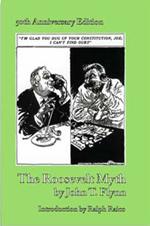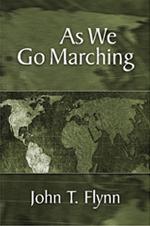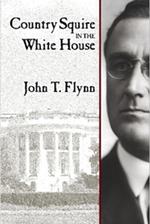The symbol of liberalism’s complete domination over education in the United States is the absence of any academic book that is hostile to Roosevelt’s domestic economic policies and his foreign policy.
America’s educational system has a supreme myth that serves as the foundation of American statism: “Franklin Roosevelt got America out of the Great Depression. He saved capitalism from itself.”
Actually, this was a joint effort. Hitler invaded Poland. Then England went to war to defend Poland, which was militarily impossible, which military strategists in Britain knew at the time. Then the British government started ordering American-made goods. Until wartime orders from Great Britain in 1940 began to stimulate domestic production in America, the American economy remained in depression.
In 1941, the American economy was still weak. Our entry into World War II, which Roosevelt had promised voters in his 1940 campaign would not happen, justified the Federal Reserve System’s policy of mass inflation. Wartime wage controls kept wages from rising. This lowered real wages, creating demand for workers. Then the draft boards pulled 12 million men into the military. Most were shipped overseas. Full employment at home was restored!
War was Roosevelt’s tool of economic recovery: inflation, controls, and the draft.
This story of the New Deal is not in the high school and college history textbooks. Roosevelt died in 1945. Over six decades later, the truth is still ignored in all of the textbooks. This is proof that the liberal Establishment is still in control of America. It controls what future voters believe about the success of the Federal government in solving America’s biggest problems: threats to domestic prosperity and peace. The fact is, the Federal government is the number-one source of these threats.
The New Deal consummated the revolution in centralism launched by Abraham Lincoln in 1861—65 and extended by Woodrow Wilson, 1913—21. No book tells the story of the New Deal in this context. We need such a book.
[For other books we need, click here.]
WHAT’S THE PROBLEM?
The story of the United States that is told in high school textbooks, college textbooks, and virtually all monographs is that the New Deal was necessary to overcome the Great Depression and overthrow Nazi and Japanese tyranny.
The story assumes that what Roosevelt did was constitutional, or, if it wasn’t (sometimes grudgingly admitted by the textbook’s author), then the Constitution had to be scrapped by him in the twin emergencies of depression and war.
There is no book that targets college graduates which tells the story of the New Deal as an illegitimate revolution against the Constitution. No well-documented book shows that the New Deal’s domestic economic policy was a failure and also that its foreign policy was a conspiracy against the public and the opposite of Roosevelt’s explicit political assurances of peace in the 1940 Presidential campaign. There are a few academic books that admit even one thesis; none asserts both.
Until the New Deal is exposed as a conspiracy against Constitutional liberties, liberalism will carry on without much resistance. Conservatives will uncritically accept the New Deal, as Reagan did and as Newt Gingrich does. As long as FDR is seen as a liberator and not as a conspirator against liberty, citizens will remain captives of the worldview which FDR represented: statist to the core.
POSSIBLE SOLUTIONS
The study should discuss the New Deal as an extension of the political centralization of the early Republican Party and also an extension of Progressivism, which captured the Democrats in the campaign of 1896: Bryan’s.
It should show that the Great Depression was caused by Federal Reserve monetary inflation, 1924—29. It should show that the FED inflated after 1930, but to no effect. It should treat the depression in terms of Mises’ monetary theory of the business cycle.
 It should discuss Hoover’s economic policies as precursors to Roosevelt’s. It should also show that both Hoover and Roosevelt had been employed in the early 1920’s by American corporate interests that sought favors from the Federal government.
It should discuss Hoover’s economic policies as precursors to Roosevelt’s. It should also show that both Hoover and Roosevelt had been employed in the early 1920’s by American corporate interests that sought favors from the Federal government.
It should show that Roosevelt campaigned on a limited government platform in 1932, yet immediately adopted an anti-Constitutional grab for power during the first hundred days. He immediately closed the banks, which had been Hoover’s idea. On his own authority, he signed an executive order confiscating Americans’ gold. This was only the beginning.
 It should show that Roosevelt adopted policies in 1941 that were calculated to provoke Japan into an attack. It should show that he knew the attack was imminent on the weekend of December 6.
It should show that Roosevelt adopted policies in 1941 that were calculated to provoke Japan into an attack. It should show that he knew the attack was imminent on the weekend of December 6.
It should show that wartime inflation, the military draft, and price and wage controls were what got the economy out of the depression, at a terrible price.
WHERE TO BEGIN
 Always begin with John T. Flynn’s book, The Roosevelt Myth (1948). In 1958, when I first began studying the New Deal, this was the only book that was hostile to both New Deal domestic policy and foreign policy. In 2007, it is still the only book. It lacks footnotes at crucial points. His other books are important: As We Go Marching and Country Squire in the White House.
Always begin with John T. Flynn’s book, The Roosevelt Myth (1948). In 1958, when I first began studying the New Deal, this was the only book that was hostile to both New Deal domestic policy and foreign policy. In 2007, it is still the only book. It lacks footnotes at crucial points. His other books are important: As We Go Marching and Country Squire in the White House.
Edgar Eugene Robinson’s book, The Roosevelt Leadership, 1933—1945 (Lippencott, 1955), was as close to a critical account as academia allowed; it came half a century ago.
On Federal Reserve policy, Murray Rothbard’s book, America’s Great Depression. It covers Hoover’s failure. Rothbard’s book supplied Paul Johnson with his interpretive framework for discussing the origins of the depression in Modern Times (1983).
On the history of Hoover and Roosevelt, see Antony Sutton’s book, Wall Street and FDR (1975).
On the revolutionary aspect of the New Deal, read Garet Garrett’s The Revolution Was and The People’s Pottage.
On FDR and Pearl Harbor, there are many books. I provide an introduction here.
http://archive.lewrockwell.com/north/north330.html
http://archive.lewrockwell.com/north/north26.html
Once hard to locate, Porter Sargent’s book, Getting US into War (1941), is on-line with Questia. A better way is to send $50 to http://AmericanDeception.com and order its CD, which has dozens of great books on it, including this one.
A well-respected academic historian, Thomas Fleming (not the editor of Chronicles), wrote The New Dealers’ War: FDR and the War Within World War II (2001). This book is a major break from Roosevelt worship, and the Establishment reviewers attacked him for this. See the snide reviews posted on Amazon.
CONCLUSION
 The historical blackout has gone on for too long.
The historical blackout has gone on for too long.
I hope some energetic young historian perceives an opportunity here!
July20, 2007
Gary North [send him mail] is the author of Mises on Money. Visit http://www.garynorth.com. He is also the author of a free 19-volume series, An Economic Commentary on the Bible.
Copyright © 2007 LewRockwell.com




